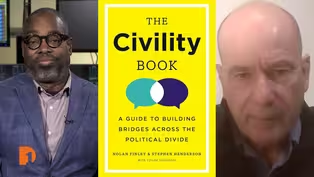
Michigan leaders will discuss economy, jobs and more at 2025 Mackinac Policy Conference
Clip: Season 9 Episode 47 | 7m 36sVideo has Closed Captions
One Detroit contributor Zoe Clark gets details about the 2025
The 2025 Mackinac Policy Conference on May 27-30 brings together government, business and philanthropic leaders from Michigan and beyond to discuss the state’s economy, businesses, education sector, jobs, housing and quality of life. One Detroit contributor Zoe Clark talks with Detroit Regional Chamber President and CEO Sandy Baruah and 2025 Conference Chair Peter Quigley about what to expect.
Problems playing video? | Closed Captioning Feedback
Problems playing video? | Closed Captioning Feedback
One Detroit is a local public television program presented by Detroit PBS

Michigan leaders will discuss economy, jobs and more at 2025 Mackinac Policy Conference
Clip: Season 9 Episode 47 | 7m 36sVideo has Closed Captions
The 2025 Mackinac Policy Conference on May 27-30 brings together government, business and philanthropic leaders from Michigan and beyond to discuss the state’s economy, businesses, education sector, jobs, housing and quality of life. One Detroit contributor Zoe Clark talks with Detroit Regional Chamber President and CEO Sandy Baruah and 2025 Conference Chair Peter Quigley about what to expect.
Problems playing video? | Closed Captioning Feedback
How to Watch One Detroit
One Detroit is available to stream on pbs.org and the free PBS App, available on iPhone, Apple TV, Android TV, Android smartphones, Amazon Fire TV, Amazon Fire Tablet, Roku, Samsung Smart TV, and Vizio.
Providing Support for PBS.org
Learn Moreabout PBS online sponsorship(light music) - So Sandy, let's start with you, first, just for someone right now watching, a Michigander, why does the conference matter to the state of Michigan?
- Well, it is Michigan's center stage, it's also Michigan's management retreat.
It's the only place where you bring 1,500 leaders from the philanthropic community, the education community, and of course, the business community, you know, together in one spot, and they're all on equal ground.
They're all, I mean, it is Switzerland, Mackinac Island is Switzerland of Michigan.
So there's no better place to do this.
And you know, it's been around 50 years.
If I had to recreate it, I couldn't do it.
- Well, so Peter, as chair, you do get to choose the theme.
Tell me a little bit about it this year and what it directly means to you.
- First of all, I'm really honored to be the chair for this esteemed conference.
And I think this is a particularly unique time, given all that's going on.
And I think, I don't think there's an organization in Michigan that hasn't been impacted by what's going on in the federal level, but whether it's a business or an educational institution, a not-for-profit, media, educational institutions all have been impacted by what's going on at the federal level, but also locally.
And I think with so much change and so much disruption and so much polarization, I think this is a really good time for a group to come together and talk about the issues that are impacting the region and the state.
And so, the theme for this year is Equation for Impact.
And the idea is to take the vision plus tools, resources, and they need action.
And that's really what we're trying to communicate is the importance of getting impact and a result and outcomes from all of the great ideas and cooperation that we get on the island.
- So this equation, the first part is about vision.
I'm curious, Sandy, when you think about the conference and you think about the folks who are coming to the conference, who is determining what that vision looks like for our state?
- Well, the conference is a gathering of 1,500 of the top leaders in our state, from government, from philanthropy, from business, from education.
And, you know, those are really the leaders of our state.
And the only way, and Peter talks eloquently about this, the only way to actually, you know, make change, to make progress is that are we aligned?
And, you know, when you look at the history of, say the City of Detroit, Detroit went through, you know, bankruptcy and came rocketing out of it, thanks to the alignment of those very sectors, we just need to do that at the statewide level as well.
- And then the other part of the equation, Peter, are the tools.
What are the tools?
What's the toolbox that you're providing at this conference or that you're hoping people think about?
- Yeah, well, we're talking about the things that we have access to.
So in Michigan, that's incredible economic resources, but we need to build some of those tools, the capabilities that we need for the next generation of business, AI, some other important enablers of economic prosperity and growth, and we'll have speakers and we'll have hosted sessions that we'll deal with each of the relevant tools that we can bring to bear.
But to Sandy's point, we need to do it collectively.
- And then there's a real call to action, right?
Because I think sometimes that's the part that gets missed, the actual doing.
You know, Sandy, you've often talked about at the end of this conference, sort of a playbook or just sort of a like go out, do the things.
What are you hoping people are going to take away from this specific conference this year?
That action part of the equation?
- It's hard to anticipate in advance because we don't script our speakers, right?
And so what we're hoping is that some of the big things that we need to focus on are actually kind of very immediate things as well, such as, you know, how does this state, how does its government, how does its industry respond to the national policy environment?
We have a very dramatically different national policy environment.
You know, some people love it, some people don't love it quite so much.
But the question is, regardless if you love it or don't love it, we have to respond to it.
So how do we handle that?
- Yeah, well, that's the question.
I mean, and you've talked about the unprecedented times that we find ourselves in.
There's some economic certainty, there is political uncertainty.
How do you see the conference playing a role right now in the environment in which we find ourselves?
- Well, I think even or notwithstanding this really turbulent environment, I think there are certain things where there is common ground among the disparate constituents that are represented at the conference.
An example is 60 by 30.
So getting more of our citizenry who are graduating from high school to either get a degree or some kind of credentialing.
To a person, I think everybody thinks that's a good idea, notwithstanding all of the challenges that may be facing us because of what's going on in the macro-environment.
But if we can focus on that, we can marshal the resources that we have at the conference to focus on that, for example, would be a great outcome and one that I think we could move the needle on getting to 60 by 30.
- Sandy, it does feel like that is what folks want, right?
Some pillar, at least, moving the needle, making some change.
But as we've talked about, there are some folks out there that are just sort of angry, angry at systems, angry at institutions, right?
This sort of just break it all down.
I'm curious how you are thinking this year about the conference's role in whether it be bipartisanship, whether it be civility, and can we have those things right now in America?
- Well, I think that's one of the beauties of the conference is because one of its cornerstones is civility, right?
There's a reason why people of all political stripes come to the conference because they know it's one of the few places now where you can have a calm and even friendly conversation with someone of a different political stripe, a different geographic stripe, a different industry stripe.
And you know you're gonna get value out of it because that's what the conference is built on, right?
I mean, there's a reason why we say, "Hey, no ties."
And there's a reason why we occasionally serve a cocktail or two because we want people to get, you know, we want people to let their guard down.
And that happens at the conference, no matter who you are, you could be the CEO of a major global company, or you could be a little plebe like me and everyone's equally accessible on that porch.
Black Leaders Detroit launches 1,645-mile Ride for Equity to support Black entrepreneurs
Video has Closed Captions
Clip: S9 Ep47 | 4m 50s | Black Leaders Detroit CEO Dwan Dandridge shares details about the 2025 Ride for Equity. (4m 50s)
New book from veteran Detroit journalists encourages people to find value in disagreements
Video has Closed Captions
Clip: S9 Ep47 | 8m 6s | One Detroit contributors Stephen Henderson and Nolan Finley discuss “The Civility Book.” (8m 6s)
One Detroit Weekend | Things to do around Detroit this weekend: May 23, 2025
Video has Closed Captions
Clip: S9 Ep47 | 1m 41s | Cecelia Sharpe and Peter Whorf of 90.9 WRCJ share upcoming events for Memorial Day weekend. (1m 41s)
Providing Support for PBS.org
Learn Moreabout PBS online sponsorshipSupport for PBS provided by:
One Detroit is a local public television program presented by Detroit PBS














